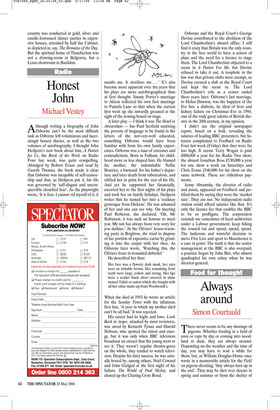Honest John
Michael Vestey
Although writing a biography of John Osborne can’t be the most difficult task as Osborne left voluminous and laceratingly honest diaries, as well as the two volumes of autobiography, I thought John Heilpern’s new book about him, A Patriot for Us, the Book of the Week on Radio Four last week, was quite compelling. Abridged by Robert Evans and read by Gareth Thomas, the book made it clear that Osborne was incapable of self-censorship and that, as Heilpern put it, his life was governed by ‘self-disgust and unconquerable clenched fear’. As the playwright wrote, ‘It is fear. I cannot rid myself of it, it numbs me. It sterilises me .. . ’ It’s also become more apparent over the years that his plays are more autobiographical than at first thought. Jimmy Porter’s marriage to Alison reflected his own first marriage to Pamela Lane so that when the curtain first went up she inwardly groaned at the sight of the ironing board on stage.
A later play — I think it was The Hotel in Amsterdam — has Paul Scofield satirising the poverty of language to be found in the letters of the not-very-well educated, something Osborne would have been familiar with from his own family experiences. Osborne was a man of extremes and contradictions. Born in Fulham, his childhood more or less shaped him. He blamed his mother, the indomitable Nellie Beatrice, a barmaid, for his father’s departure and later death from tuberculosis, and vilified her in print for the rest of his life. And yet he supported her financially, escorted her to the first nights of his plays and took her on family holidays. Heilpern writes that he turned her into a ‘cockney grotesque from Dickens’. He was ashamed of her and one can see why. On meeting Paul Robeson, she declared, ‘Oh, Mr Robinson, it was such an honour to meet you. My son has always been very sorry for you darkies.’ At the Oliviers’ house-warming party in Brighton, she tried to dispose of her portion of expensive caviar by grinding it into the carpet with her shoe. As Osborne later wrote, ‘Watching this, the Oliviers froze in wounded disbelief.’ He described her thus:
Her face was a flowery dark mask, her eyes were an irritable brown. Her remaining front teeth were large, yellow and strong. Her lips were a scarlet black sliver covered in slime named Tahiti or tattoo which she bought with all her other make-up from Woolworth’s.
When she died in 1993 he wrote an article for the Sunday Times with the infamous first line, ‘A year in which my mother died can’t be all bad.’ It was rejected.
His career had its highs and lows. Look Back in Anger, attacked by most reviewers, was saved by Kenneth Tynan and Harold Hobson, who spotted the talent and energy, but it was only when BBC television broadcast an extract that the young went to see it. They weren’t regular theatre-goers on the whole, they tended to watch television. Despite his later success, he was actually booed by, among others, Noël Coward and John Gielgud at the first night of his failure, The World of Paul Slickey, and chased up the Charing Cross Road. Osborne and the Royal Court’s George Devine contributed to the abolition of the Lord Chamberlain’s absurd office. I still find it crazy that Britain was the only country in the free world to have a censor of plays and the need for a licence to stage them. The Lord Chamberlain objected to a scene in A Patriot For Me, but Devine refused to take it out. A loophole in the law was that private clubs were exempt, so Devine created a club at the Royal Court and kept the scene in. The Lord Chamberlain’s role as a censor ended three years later. Osborne’s last marriage, to Helen Dawson, was the happiest of the five but, a diabetic, he died of liver and kidney failure on Christmas Eve in 1994, one of the truly great talents of British theatre in the 20th century, in my opinion.
I didn’t see the original newspaper report, based on a leak, revealing the salaries of leading BBC presenters, but listeners complained to Feedback on Radio Four last week (Friday) that they were far too high. It seems Terry Wogan is paid £800,000 a year for his Radio Two show, the absurd Jonathan Ross £530,000 a year for one show a week on Saturdays and Chris Evans £540,000 for his show on the same network. These are ridiculous payments.
Jenny Abramsky, the director of radio and music, appeared on Feedback and justified them by saying they were the ‘market rate’. They are not. No independent radio station could afford salaries like that. It’s only the licence fee that enables the BBC to be so profligate. The corporation reminds me sometimes of local authorities under a Labour government: keep hiking the council tax and spend, spend, spend. The ludicrous and wasteful decision to move Five Live and sport to Manchester is a case in point. The truth is that the senior management at the BBC is also overpaid, a practice begun by John Birt, who almost quadrupled his own salary when he was director-general.


















































































 Previous page
Previous page